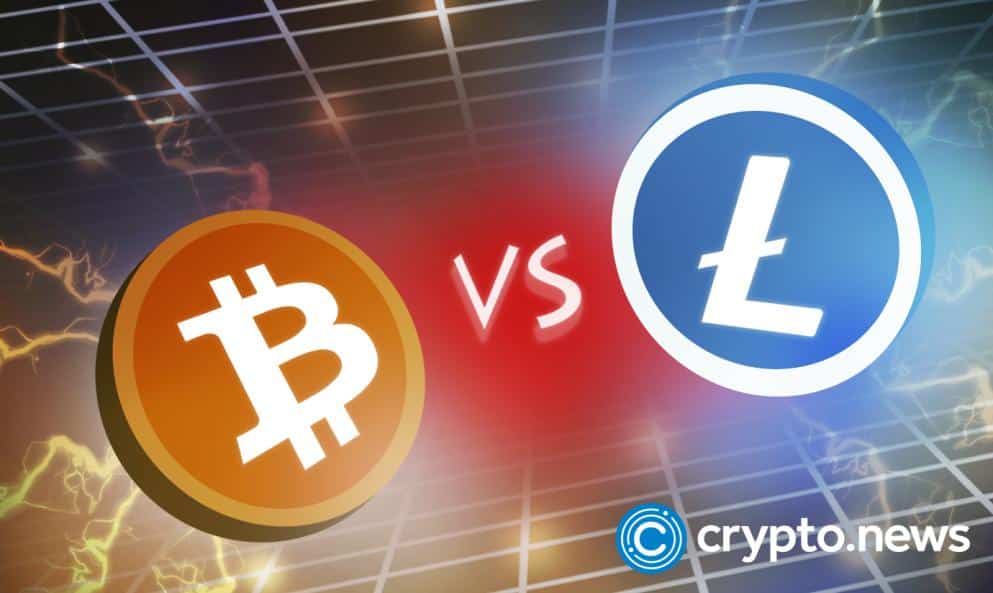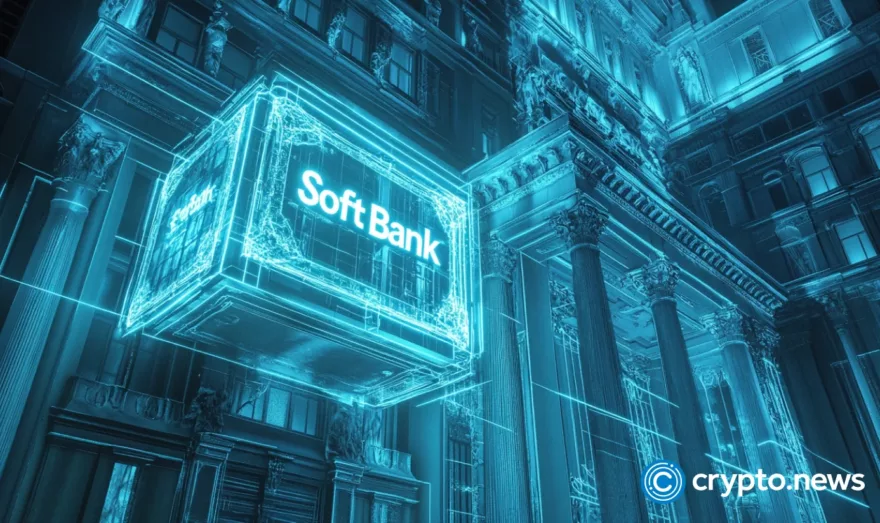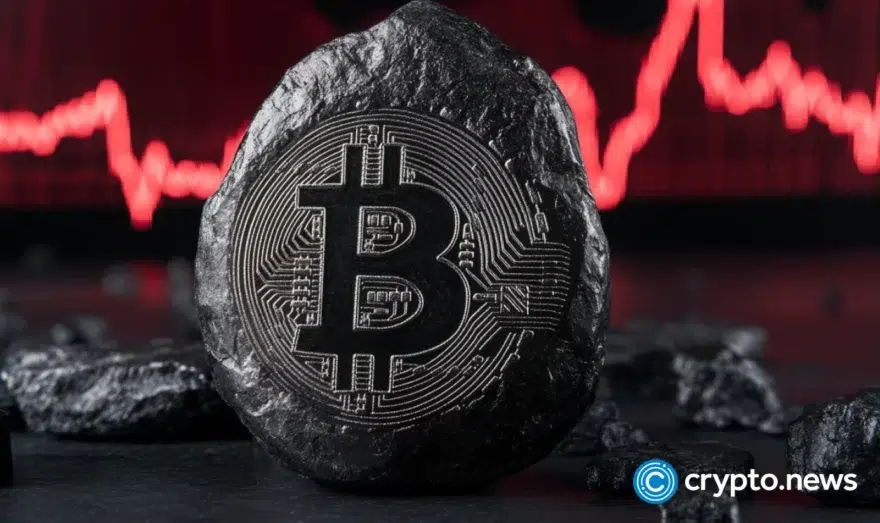Bitcoin vs. Litecoin: What’s the Difference?

Bitcoin and Litecoin are two of the oldest and most popular cryptocurrencies available today. Bitcoin was created by Satoshi Nakamoto in 2008 as the first cryptocurrency ever, while Litecoin was created by Charles Lee in 2011 as Bitcoin’s “little brother.” While they share many similarities, such as the source code that they are built on, some key differences set them apart. In this guide, we’ll answer the question: what is the difference between Bitcoin and Litecoin?
Table of Contents
What Is Bitcoin?
Bitcoin was created by a person or group of people who went by the name Satoshi Nakamoto as the first decentralized, peer-to-peer digital currency that enables users to facilitate transactions without using an intermediary like a bank or a payment provider.
Bitcoin transactions are verified by a peer-to-peer network called the blockchain. The blockchain is essentially a public ledger of every bitcoin transaction ever made. This ensures that every single bitcoin is accounted for and that no single entity can change an entry once it is recorded.
Bitcoin mining is the process of verifying transactions on the blockchain and adding them to the public ledger. The miners who complete this process are rewarded with transaction fees and newly minted Bitcoins (called “block rewards”).
What Is Litecoin?
Litecoin is an open-source, peer-to-peer digital currency that enables borderless, near-instant global.
Litecoin was created in October 2011 by Charles Lee as a lighter version of Bitcoin. The main purpose for creating Litecoin was to create a faster alternative to Bitcoin that could be used in day-to-day transactions. It also had the benefit of being able to process more transactions per second than the Bitcoin network. This can be useful in high-traffic environments such as online gaming communities or shopping sites. While it managed to maintain its position among the top ten cryptocurrencies by market capitalization for many years, it has dropped off the radar lately as layer-1 blockchains have taken an increasing market share of the global crypto markets.
Let’s take a look at the technical similarities and differences of these two popular digital currencies.
| Feature | Bitcoin | Litecoin |
| Launch date | 2009 | 2011 |
| Creator | Satoshi Nakamoto | Charlie Lee |
| Coin supply | 21 million | 84 million |
| No. of coins mined (as of Sep. 15, 2022) | 19,151,212 (91.19%) | 71,172,983 (84.72%). |
| Mining algorithm | SHA-256 | Scrypt |
| Block rewards halved | every 210,000 blocks | every 840,000 blocks |
| Average transaction time | 10 minutes | 2.5 minutes |
| Market capitalization (as of Sep. 14, 2022) | $386,672,603,340 | $4,287,206,448 |
| Price per coin (as of Sep. 14, 2022) | $20,377 | $60.77 |
What Is the Difference Between Litecoin and Bitcoin?
Now, let’s take a look at how Litecoin and Bitcoin differ by comparing the two cryptocurrencies’ coin supply and block rewards, consensus algorithms, transaction speeds, adoption rates, and communities.
Coin Supply
Litecoin has a coin limit of 84 million, while Bitcoin has a coin limit of 21 million. Therefore, there will eventually be four times as many Litecoins in circulation as there are bitcoin. Currently, there are about 71 million LTC in circulation, and the maximum supply will be reached sometime in 2142. On the other hand, there are around 19 million BTC in circulation, and the last bitcoin is expected to be mined in the year 2140.
Block Rewards
The block reward is the number of coins that miners receive for successfully creating a new block. This reward is halved every four years for Bitcoin as well as Litecoin. Currently, Litecoin’s block reward is 12.5 LTC per block, whereas Bitcoin’s is 6.25 BTC per block. The next Bitcoin halving will be in May 2024, while that of Litecoin is in August 2023.
Consensus Algorithm
Another key difference between Bitcoin and Litecoin is the algorithm that each uses to mine new coins. Bitcoin uses the SHA-256 algorithm while Litecoin uses the Scrypt algorithm. The main difference between these two Proof of Work algorithms is that Scrypt is more memory intensive than SHA-256. This means that it’s more difficult to develop specialized hardware (ASICs) for mining Scrypt-based coins like Litecoin. As a result, Litecoin mining is more accessible to general users than Bitcoin mining, as at-home miners can mine the digital currency more easily.
Transaction Speeds
One major difference between Bitcoin and Litecoin concerns transaction speeds. On average, bitcoin transactions take about 10 minutes to confirm. Litecoin transactions, on the other hand, take around 2.5 minutes to confirm. This faster confirmation time makes Litecoin technically more attractive for small-scale purchases and day-to-day transactions. Furthermore, it also means that Litecoin may be more suitable for merchants who want to accept cryptocurrency payments.
Transaction Fees
In the matter of Litecoin vs. Bitcoin, both have relatively low transaction fees. However, Bitcoin’s fees are generally higher compared to Litecoin’s. Currently, Bitcoin’s transaction fee is around $1.28 per transaction. With Litecoin, the transaction fee is only about $0.01 per transaction.
This is because Bitcoin’s transaction volume is much higher than Litecoin’s. A higher transaction volume means more demand by consumers to use the network. As a result, Bitcoin miners can afford to charge higher transaction fees.
Adoption
Bitcoin and Litecoin both have the same goal: to be a globally accepted currency. However, Bitcoin has been around for longer than Litecoin and has a much bigger brand. As a result, more people have heard of it, and it is now the most widely adopted cryptocurrency.
Community
The community surrounding Bitcoin is much larger than the Litecoin community. More people know about it and can help you if you have questions or problems using it. Bitcoin also has a larger community of developers working on it, who are developing new features and improvements every day. The Litecoin community, on the other hand, is very small, and the amount of developers working on the digital currency’s roadmap is reportedly very small.
Market Value
The market value of Litecoin is about $4.2 billion, while the market value of Bitcoin is about $386.6 billion as of Sep 15, 2022. Bitcoin is more than 90 times more valuable than Litecoin right now. If you’re just looking to make money off of your cryptocurrency investments, this is an important thing to consider.
Bottom Line
So, which one should you choose? Ultimately, it depends on your investment goals and personal preferences. If you’re looking for a more established cryptocurrency with wider acceptance, then Bitcoin might be the better choice, especially as an investment.
If you’re interested in faster transactions and lower fees, then Litecoin could be a better option. Having said that, in the coming years, there will probably be more merchants accepting Bitcoin Lightning Network payments than Litecoin payments, which will essentially make Litecoin obsolete as a spending currency.
FAQs
Is Litecoin Better Than Bitcoin?
No. Bitcoin has much wider acceptance as a digital currency, as an investment, and as a store of value. So the market has arguably decided that Bitcoin is “better” than Litecoin.
However, at-home miners may disagree as it’s easier to mine LTC than BTC, due to its mining algorithm. Moreover, Litecoin can do faster and cheaper on-chain transactions, which may be appealing to cryptocurrency users who transact in large amounts.
Why Is Litecoin So Cheap?
Compared to Bitcoin, Litecoin has a substantially lower dollar price because BTC is perceived to be a more valuable asset than LTC. Bitcoin has a more recognized brand as a currency and as an investment asset. It is also more liquid and, generally, the go-to asset for first-time crypto buyers. Litecoin is typically lower down on the list of cryptocurrencies to invest in, which contributes to its low dollar price.
Is Litecoin Linked to Bitcoin?
Litecoin is closely linked to Bitcoin in the sense that it was created using a copy of Bitcoin’s source code. This is different from forking and makes Litecoin a completely new blockchain. Although made from the same source code, Litecoin and Bitcoin have some crucial differences.
Can Litecoin Compete with Bitcoin?
Litecoin was designed and is often considered a complement to Bitcoin and not a competitor. Due to its similarities with Bitcoin, Litecoin is sometimes used as an appropriate testnet for the Bitcoin protocol. For example, after Litecoin adopted the SegWit soft fork, Bitcoin followed suit since it provided evidence of better performance.















